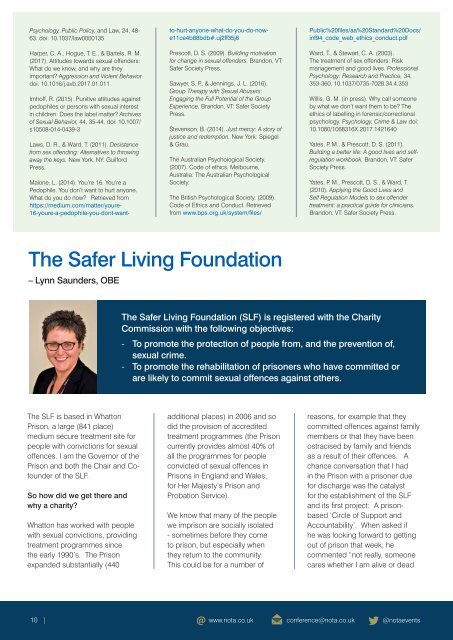NOTA News Newsletter July 2018 1
Create successful ePaper yourself
Turn your PDF publications into a flip-book with our unique Google optimized e-Paper software.
Psychology, Public Policy, and Law, 24, 48-<br />
63. doi: 10.1037/law0000135<br />
Harper, C. A., Hogue, T. E., & Bartels, R. M.<br />
(2017). Attitudes towards sexual offenders:<br />
What do we know, and why are they<br />
important? Aggression and Violent Behavior<br />
doi: 10.1016/j.avb.2017.01.011<br />
Imhoff, R. (2015). Punitive attitudes against<br />
pedophiles or persons with sexual interest<br />
in children: Does the label matter? Archives<br />
of Sexual Behavior, 44, 35-44. doi: 10.1007/<br />
s10508-014-0439-3<br />
Laws, D. R., & Ward, T. (2011). Desistance<br />
from sex offending: Alternatives to throwing<br />
away the keys. New York, NY: Guilford<br />
Press.<br />
Malone, L. (2014). You’re 16. You’re a<br />
Pedophile. You don’t want to hurt anyone.<br />
What do you do now? Retrieved from<br />
https://medium.com/matter/youre-<br />
16-youre-a-pedophile-you-dont-want-<br />
to-hurt-anyone-what-do-you-do-now-<br />
e11ce4b88bdb#.uj2ff35j6<br />
Prescott, D. S. (2009). Building motivation<br />
for change in sexual offenders. Brandon, VT:<br />
Safer Society Press.<br />
Sawyer, S. P., & Jennings, J. L. (2016).<br />
Group Therapy with Sexual Abusers:<br />
Engaging the Full Potential of the Group<br />
Experience. Brandon, VT: Safer Society<br />
Press.<br />
Stevenson, B. (2014). Just mercy: A story of<br />
justice and redemption. New York: Spiegel<br />
& Grau.<br />
The Australian Psychological Society.<br />
(2007). Code of ethics. Melbourne,<br />
Australia: The Australian Psychological<br />
Society.<br />
The British Psychological Society. (2009).<br />
Code of Ethics and Conduct. Retrieved<br />
from www.bps.org.uk/system/files/<br />
Public%20files/aa%20Standard%20Docs/<br />
inf94_code_web_ethics_conduct.pdf<br />
Ward, T., & Stewart, C. A. (2003).<br />
The treatment of sex offenders: Risk<br />
management and good lives. Professional<br />
Psychology: Research and Practice, 34,<br />
353-360. 10.1037/0735-7028.34.4.353<br />
Willis, G. M. (in press). Why call someone<br />
by what we don’t want them to be? The<br />
ethics of labelling in forensic/correctional<br />
psychology. Psychology, Crime & Law doi:<br />
10.1080/1068316X.2017.1421640<br />
Yates, P. M., & Prescott, D. S. (2011).<br />
Building a better life: A good lives and selfregulation<br />
workbook. Brandon, VT: Safer<br />
Society Press.<br />
Yates, P. M., Prescott, D. S., & Ward, T.<br />
(2010). Applying the Good Lives and<br />
Self Regulation Models to sex offender<br />
treatment: a practical guide for clinicians.<br />
Brandon, VT: Safer Society Press.<br />
The Safer Living Foundation<br />
– Lynn Saunders, OBE<br />
The Safer Living Foundation (SLF) is registered with the Charity<br />
Commission with the following objectives:<br />
- To promote the protection of people from, and the prevention of,<br />
sexual crime.<br />
- To promote the rehabilitation of prisoners who have committed or<br />
are likely to commit sexual offences against others.<br />
The SLF is based in Whatton<br />
Prison, a large (841 place)<br />
medium secure treatment site for<br />
people with convictions for sexual<br />
offences. I am the Governor of the<br />
Prison and both the Chair and Cofounder<br />
of the SLF.<br />
So how did we get there and<br />
why a charity?<br />
Whatton has worked with people<br />
with sexual convictions, providing<br />
treatment programmes since<br />
the early 1990’s. The Prison<br />
expanded substantially (440<br />
additional places) in 2006 and so<br />
did the provision of accredited<br />
treatment programmes (the Prison<br />
currently provides almost 40% of<br />
all the programmes for people<br />
convicted of sexual offences in<br />
Prisons in England and Wales,<br />
for Her Majesty’s Prison and<br />
Probation Service).<br />
We know that many of the people<br />
we imprison are socially isolated<br />
- sometimes before they come<br />
to prison, but especially when<br />
they return to the community.<br />
This could be for a number of<br />
reasons, for example that they<br />
committed offences against family<br />
members or that they have been<br />
ostracised by family and friends<br />
as a result of their offences. A<br />
chance conversation that I had<br />
in the Prison with a prisoner due<br />
for discharge was the catalyst<br />
for the establishment of the SLF<br />
and its first project: A prisonbased<br />
‘Circle of Support and<br />
Accountability’. When asked if<br />
he was looking forward to getting<br />
out of prison that week, he<br />
commented “not really, someone<br />
cares whether I am alive or dead<br />
10 | www.nota.co.uk conference@nota.co.uk @notaevents





